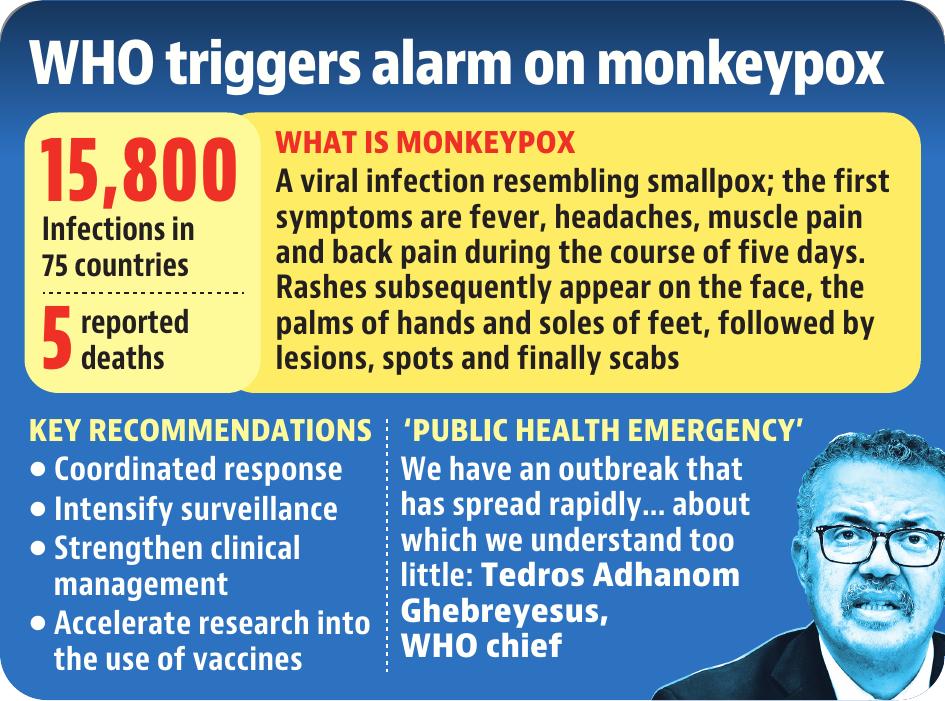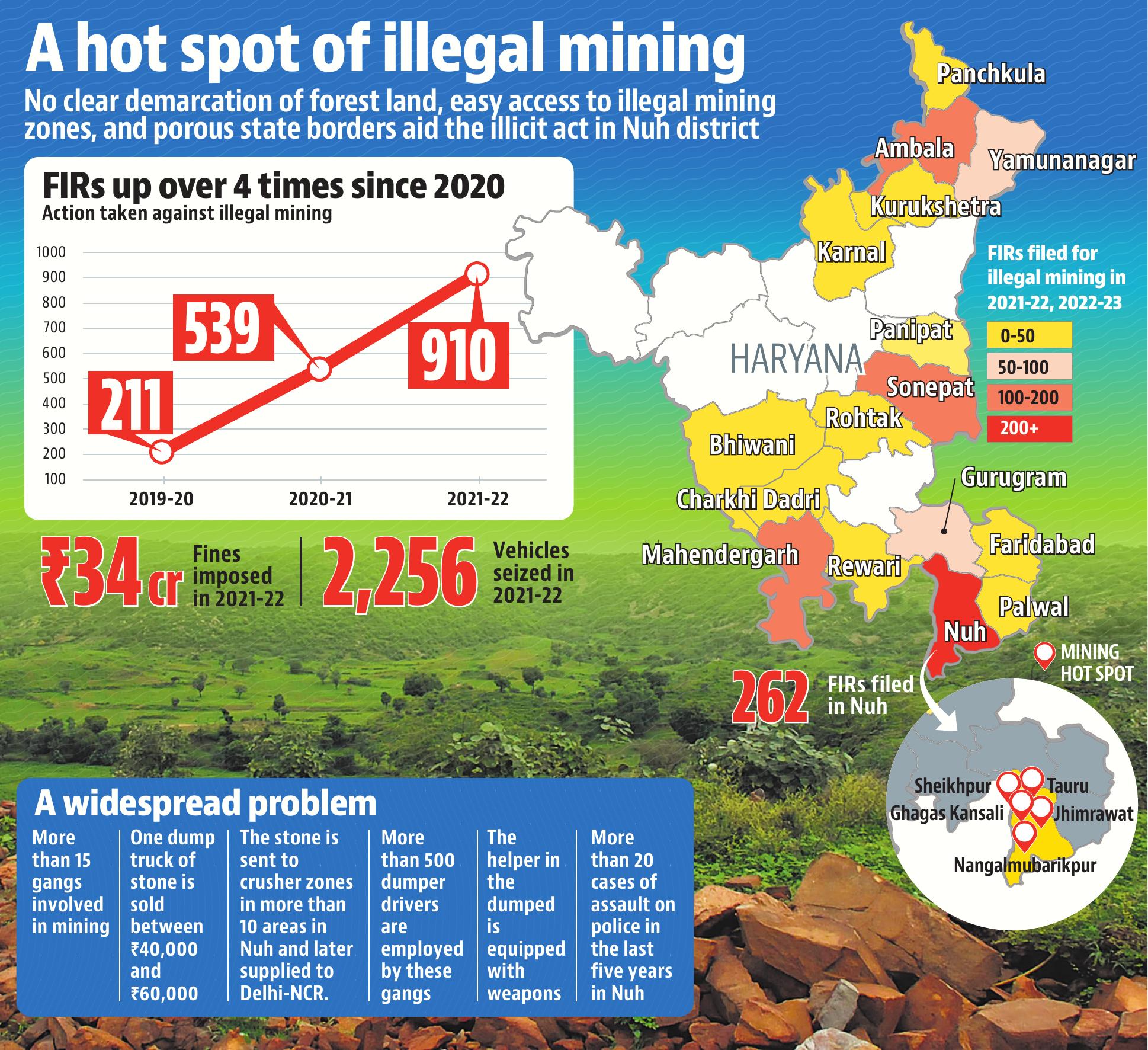| Good morning! The crime, the Covid, the politics and the potholes: Capital Letters — Keeping track of Delhi's week, one beat at a time, through the eyes and words of HT's My Delhi section, with all the perspective, context and analysis you need. Nature took a long, hard look around at the planet and must’ve thought, “You know what this place needs? Another global health emergency.” So, even as the world wages on in a battle against the pandemic, the World Health Organization on Saturday evening declared monkeypox a global health emergency, a step that will allow a coordinated international effort against the virus, which has infected over 15,800 people across the world. Deaths of the infection are, to be sure, rare, with only five people having succumbed to the virus so far. Hours after the WHO’s Saturday declaration, a monkeypox case was detected in Delhi – the city’s first and the country’s fourth. The infected person is being treated at the Lok Nayak Hospital and is “stable and recovering,” according to Delhi chief minister Arvind Kejriwal, who said the situation is under control.  (Click to expand) The infection is a viral zoonosis (transmitted from animals to humans), with symptoms similar to smallpox, but less severe. It primarily occurs in central and west Africa, often near tropical rainforests, with a wider footprint in urban areas over recent years. WHO director-general Tedros Adhanom Ghebreyesus said monkeypox is, for now, “an outbreak that is concentrated among men who have sex with men, especially those with multiple sexual partners.” He, however, cautioned against associating the disease with any groups of people, in a vital bid to avoid stigmatisation, especially in the wake of several reports of discrimination against those recovered from Covid-19. Lightning in a bottle For the cosmopolitan metropolis that Delhi is, it’s surprisingly boorish about drinking. At 25, the legal drinking age in the national capital is among the highest in the country, the bars shut by 1am, liquor stores shut by 10pm and neighbouring Gurugram often dishes out more attractive offers. The new Delhi excise policy, introduced in March last year, wanted to change all of this, and usher the city’s liquor regime out of the dark ages. For the end-consumer, the policy would cut Delhi’s drinking age to 21, allow bars to stay open till 3am, allow for better-designed and safer stores, and (most importantly, for some) pave the way for discounts and offers. On the business end of things, the policy would replace byzantine rules that framed the liquor space, improve revenues for the state government and minimise cartelisation. A year-and-a-half, and some challenges later, the excise policy glass was half-full or half-empty depending on what you expected (or completely empty and rotten, if you belonged to Opposition groups). The policy is now in focus for reasons that have little to do with liquor or bars, with Delhi’s Lieutenant Governor Vinai Kumar Saxena recommending a CBI probe against the plan, alleging that procedures were altered and sidestepped to benefit private vendors. Officials in the LG’s office said one of the alleged circumventions was made to extend financial benefits to the “highest levels”, including deputy chief minister Manish Sisodia, who is named in Saxena’s complaint to the central probe agency. Then, on Saturday, Saxena directed Delhi chief secretary Naresh Kumar to investigate officers, including civil servants, for their role in alleged irregularities in the excise policy. The allegations against chief minister Arvind Kejriwal’s deputy over a flagship policy has rocked the state, setting off another flashpoint between the elected government and the Centre-appointed LG - possibly one of the biggest stand-offs between the two groups since Najeeb Jung’s tumultuous time at Raj Niwas. Kejriwal, for his part, repudiated the allegations and said his government was being subjected to a witch hunt aimed at stemming their growth (AAP swept the Punjab assembly elections in March). Sisodia, he said, was staunchly honest and had transformed Delhi’s flagging education system during his time as minister. “I had said three-four months ago that these people are going to arrest our deputy CM Manish Sisodia soon. They are after the Aam Aadmi Party (AAP) because we are committed to honesty, and the whole country is convinced that the AAP is completely honest,” Kejriwal said. The battle over the excise policy came close on the heels of another major row over the LG stonewalling a scheduled Singapore visit by Kejriwal, who was supposed to attend a conference there. Saxena said the event is meant for mayors, and is not befitting for a chief minister to attend it. Kejriwal then said he will now seek approval for the trip from the Union ministry of external affairs. In fact, click here for a helpful summary of the battles the Delhi and central governments fought just over the past. With Delhi’s complex positioning as the National Capital Territory, jurisdiction and governance have been fraught subjects for several years now, with the state government and LG’s office often on different pages. The controversy this time, though, is more than likely to leave a lasting impact. Cop’s killing draws spotlight on illegal mining in Aravallis A deputy superintendent of police (DSP) was run over by a truck while investigating a tip-off on illegal mining on Tuesday in Haryana’s Nuh district, not too far from Gurugram, an incident that has set off fresh concerns not only about law and order, but also about the exploitation of the resource-rich Aravalli mountain range.  (Click to expand) In the days since DSP Surender Singh was killed, at least six people associated with the incident have been arrested, with authorities scrambling to crack down on illegal mining in Nuh. The district sees around 200 police complaints of illegal mining registered every year, the second-most in all of Haryana. This, officials and experts said, is aided by no clear demarcation of forest land, easy access to illegal mining zones, and porous state borders. Once mined, the minerals and stones are moved through narrow roads that cut across the Aravalli forest to potential buyers in Rajasthan and southern Haryana. And as mining in the Aravalli in Rajasthan through “safeguards” is allowed, it becomes difficult for authorities to distinguish between what is permissible and what is illegal, wrote HT’s Pawan Sharma, Leena Dhankhar and Jayashree Nandi in this fantastic long-read decoding the rampant problem. The Aravalli extends over 692km, from Ahmedabad in Gujarat to Delhi through Rajasthan and Haryana. Illegal mining has been destroying the mountain range, which not only acts as the green lungs for Delhi and Haryana, but also halts the Thar desert from moving eastward and regulates temperatures. Experts have attributed their attrition as one of the causes of the NCR’s toxic air quality in winter. The killing came days before the Supreme Court held that all land covered by the special orders issued under Section 4 of the Punjab Land Preservation Act (PLPA) in Haryana will be treated as forests and be entitled to protection under the 1980 Forest Conservation Act — a significant move towards protecting green-cover in the state. The order will have implications across the country in general, but is likely to directly impact public and private constructions in Haryana (and, as a result, Gurugram). |